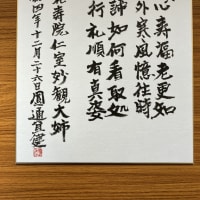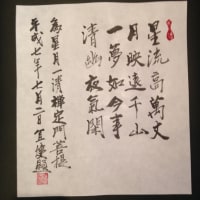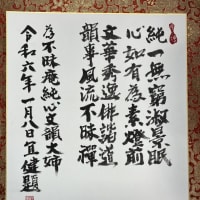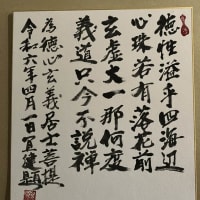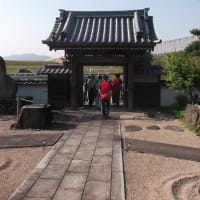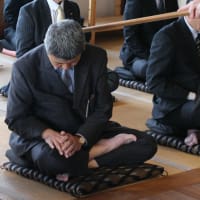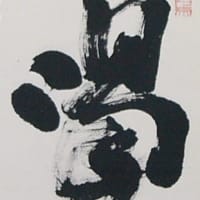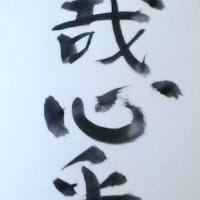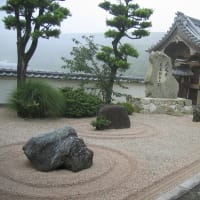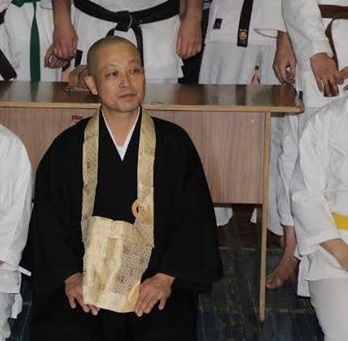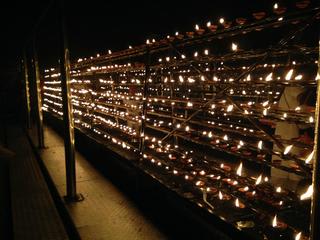
1-What is the primitive Buddhism?
We call Buddhism in the era where Buddha was alive or in the early days Buddha passed away to Nirvana "the primitive Buddhism".
A hundred years later after Buddha had passed away to Nirvana, Buddhism was divided into two sects. Further, four hundred years later, it was divided into twenty sects. In the 1st or 2nd century, the Mahayana Buddhism was established in the center of India. In other words, we could call Buddhism before the division "the primitive Buddhism".
The primitive Buddhism seems to have been referred to Zen. Is that true?
Here I will show the Pãli sutra that was inherited to Sri Lanka.
Let's take a lesson of the Buddha’s teaching that is thought to be the origin of Zen.
2-"Dhamma-pada", the sutra in Sri Lanka
Dhamma in Pãli means law. Dhamma includes many meanings such as norm, teachings, existence, truth, doctrine, among others. In this context, it is interpreted as the Buddha’s teachings.
Pada means sutra. 423 phrases of the Hokku sutra in Mahayana are regarded as Pada. In fact, the common sutras of the Buddha’s words are described in both of the Theravada Buddhism and the Mahayana Buddhism.
The fact that the common sutras exist in two sects 2500 years later after passing away of Buddha is very pleasant for Buddhists living in the world. It must be arising from Buddha’s virtue.
3-The society where Buddha was alive
The reason that Buddha, originally Gautama Siddhãrtha became a monk is thought to have been caused by wars. When he was 17 years old, he was married to Yasodharã and became a leader of Sãkyas although he was quite young. Then he frequently suffered from miserable wars.
Indian society at that time had flourished in the culture of ironware and the farming had developed. On the other hand, the conflict to compete for fertile land or water often erupted and the country was devastated by thieves.
Society was corrupt so severely that people expected a virtuous person will appear to help the world in the near future. Under such circumstances of the world, Gautama Siddhãrtha wished to rescue the people from sufferings. Therefore, he became a monk at the age of 29, gained enlightenment at 35 and kept preaching the path of righteousness for 45 years until he turned 80 years old.
4-Buddha’s personality
It is said; Buddha was tall and a good physique. He attracted people by his long arms, dignified gait, big eyes like an ox, shining beautiful appearance and a burly chest. Those who happened to meet Buddha stopped walking and those who were standing followed Buddha unconsciously. Also those who were walking slowly began to run and those who were sitting stood up. The Buddha’s voice was fascinating, low like a drumming sound and convincing as well.
5-Mercy: dysentery of a monk
One of the Buddha’s disciples suffered from dysentery. When Buddha called on him, he was lying in the shack alone. Dysentery was also recognized as one of infectious diseases at that time and the patients might die. Buddha washed a disciple's robe contaminated with filth and took care of him. Then Buddha remonstrated other disciples.
"I tell you. Unless you help each other when you are in trouble, who will help you? If I didn't visit the shack of your fellow, he would have never recovered at all. If his master was there, the master should take care of him until he recovers. If his seniors, brothers or disciples were there, they should help him until he recovers. If no one helps him, it would be the equivalent of a sin."
6-Equality
The Buddha’s disciples used to hold an evaluation meeting called Uposatha twice a month. The system of the Indian Trade Association was adopted in the meeting. Several kinds of rules were determined, which included penalties for violators. Some of the violators seem to have been deported. However, the penalty more than the expulsion seems not to have determined. The deported disciples were allowed to come back to take part in the Buddhist group, however in that case, 20 guarantors consisted by elder abbots were required.
Buddha was treated impartially same as his disciples. He followed the rules such as "having private goods is prohibited and only three pieces of robes are allowed. (five robes for nuns)" Along with other strict rules, for example, "a meal is given once a day", Buddha followed the rules that had been determined by all members. One day, Prajãpti, a Buddha’s step mother sent him two robes from Sãkya, a Buddha’s home town. Buddha said, "I already have three" and he returned them to her.
7-Buddha’s dislike matters
Buddha told that anger was the most distant feeling from enlightenment. It is said that Buddha disliked fortune-telling and politics. It indicates that in those days Indian politics was corrupt and many fortune-tellers disrupted people.
"The master said. Stop divining fortune including signs of happiness, natural disaster, dreams or physiognomy. Ascetic monks who never judge fortune will lead society correctly." Sutta Nipãta 360
原始仏教とは何か・スリランカでの記念講話 (2017年6月予定)
1-原始仏教とは何か
仏陀在世中あるいは仏陀滅後間もないころの仏教を原始仏教と呼びます。仏陀滅後100年ごろ教団は2つに分かれ、滅後400年までに20の部派に分かれました。それから約200年後の紀元1~2世紀ごろインド中央で大乗仏教が生まれました。いいかえれば分派以前を原始仏教と呼ぶことができます。原始仏教は禅であるといわれていますがはたしてそれは確かなのでしょうか。ここにスリランカに伝えられるパーリ語経典の中から資料をひき、禅の種となった仏陀の教えを学んでみましょう。
2-スリランカの仏典『ダンマパダ』
パーリ語のダンマは「法」と訳されます。規範、教え、存在、真理、教義など多くの意味がありますがここでは仏陀の教えという意味です。パダは経典です。大乗仏教の『法句経』423句はこれにあたります。そのように上座部仏教の経典と大乗仏教の経典には仏陀の言葉として共通のものが知られています。約2500年を隔てて二派に共通する経典があることは洋東西の仏教徒にとって嬉しいことであり仏陀の遺徳です。
3-仏陀のころのインド社会
仏陀ことゴーダマ・シッダールタ出家の起因は戦争経験だったと考えられます。17歳でヤソーダラと結婚しシャーキヤ国の担い手となった若き日のシッダールタは度々悲惨な戦争を目の当たりにしました。鉄器文化が盛んになった当時のインド社会は農耕が盛んになる一方で豊かな土地をめぐる戦争や水争いがあり、盗賊の横行で国が荒廃しました。著しく疲弊した社会であったから「この世の中を救ってくれる立派な人格者が出てくれる」という社会的な期待がありました。そのような中でシッダールタは乱れた社会に生きる人々を苦しみから救いたいと思い29歳で出家し35歳で悟りを開きその後80歳まで45年間教えを説きました。
4-仏陀の人柄
背は高く立派な体躯で感じのいい様子であった。長い腕、堂々とした歩き方、牡牛のような大きな目、輝くような美しさ、広い胸はすべての人を魅了したのでした。仏陀に出会ったものは足を止め立っていたものは思わず後に従い、ゆっくり歩いていたものは走り出し、坐っていたものは立ちあがった。その声は魅力的でドラムのように深い響きがあり説得力にあふれていた。
5-慈しみ:ある修行僧の赤痢
弟子の一人が赤痢にかかりました。仏陀が尋ねてみると、彼は小屋の中に一人でほったらかしにされていました。当時も赤痢は伝染する病で、かかれば死ぬかもしれないと認識されていたのです。仏陀は彼の糞だらけの衣を洗って介護をしました。そして弟子たちをいさめました。
「兄弟たちよ、もし困った時お互いに世話をし合わなければ、一体誰が世話をしてくれるというのか。私がいかなければ、あの兄弟は病にかかったままではないか。もし師がいれば、師が彼の病が癒えるまで世話をしてあげるべきだ。もし先輩や同房の仲間、弟子がいれば、その人が癒えるまで面倒を見てあげなさい。もし誰も世話をしてやらないなら、それは罪を犯していることになる」
6-平等
仏陀の弟子たちは月に二度、ウポーサタと呼ばれる反省会を催した。これはインドの商工会組織の制度を取り入れたのです。そこでは決まりを決め、また違反者は懺悔をしました。追放者もありましたが、それ以上の罪は問われませんでした。そのような人はまた入門もできましたが、その場合は長老級の比丘20人の保証人が必要でした。 仏陀も決まりに関して特別扱いではなく弟子たちと平等でした。私物を持たない、着物は3枚(尼は五枚)、一日一食、などみんなで決めたことに従われたのです。あるとき故郷のシャーキャ国の義母パジャパティから二枚の白い反物が届きました。仏陀は「着物はすでに3枚あるから」といってこれを返しました。
7-嫌ったこと
仏陀は「怒りは悟りからいちばん遠いところにある」といわれました。占いや政治談議をきらったとされています。当時、政治がいかに乱れ、巷に人々を惑わす占い師が多かったかがうかがえます。
師はいわれた。瑞兆の占い、天変地異の占い、夢占い、相の占いを完全にやめ、吉凶の判断をともにすてた修行者は正しく世の中を遍歴するだろう。『スッタニパータ』360
土曜坐禅会
●坐禅会 毎週土曜日午前6:25~8:00 久留米市宮の陣町大杜1577-1圓通寺
初心者歓迎 参加費無料 詳細は電話でお問い合わせください。℡0942-34-0350
●学校やクラブなど団体研修 坐禅申し込み随時うけたまわります。
費用はご希望に応じます。宿泊はありません。出張講座もいたします。












